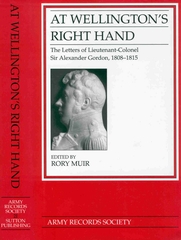Click here to view a text extract from this publication
 Alexander Gordon was no ordinary soldier. In the Corunna campaign of 1808-9 he served as aide-de-camp to his uncle, Sir David Baird; then, in 1809, he joined Wellington’s staff shortly before the battle of Talavera and remained at Wellington’s side throughout the Peninsular War and in the Waterloo campaign. Both Baird and Wellington trusted him implicitly and he was perfectly placed to see how their plans developed. His long, confidential letters home to his brother, Lord Aberdeen, provide a unique insight into the British campaigns in the Peninsula. Written weekly or, at particularly interesting times, as a daily journal the letters record every twist and turn, every raised hope and false alarm of the campaigns and often explain the thinking which lay behind Wellington's operations more fully than Wellington's own dispatches.
Alexander Gordon was no ordinary soldier. In the Corunna campaign of 1808-9 he served as aide-de-camp to his uncle, Sir David Baird; then, in 1809, he joined Wellington’s staff shortly before the battle of Talavera and remained at Wellington’s side throughout the Peninsular War and in the Waterloo campaign. Both Baird and Wellington trusted him implicitly and he was perfectly placed to see how their plans developed. His long, confidential letters home to his brother, Lord Aberdeen, provide a unique insight into the British campaigns in the Peninsula. Written weekly or, at particularly interesting times, as a daily journal the letters record every twist and turn, every raised hope and false alarm of the campaigns and often explain the thinking which lay behind Wellington's operations more fully than Wellington's own dispatches. The letters represent the most important new source to be published on the Peninsular War in at least seventy years. Gordon was only twenty-two when he landed at Corunna, and twenty-nine at Waterloo, but he was a remarkably cool, analytical and intelligent soldier as well as being a most active and brave officer. He made the long hazardous ride from Corunna to Lisbon and back carrying dispatches between Baird and Sir John Moore, and was often sent by Wellington to parley with the French -indeed, he observed the fighting at El Bodon in 1811 from Marmont’s Headquarters! Gordon also had a horse shot under him at Talavera and was frequently in the thick of the fighting, being seriously wounded in the Pyrenees in 1813. Gordon's relations with his brother, Lord Aberdeen, provide an interesting sub-plot to the correspondence. Aberdeen was an important figure, a rising young diplomat and politician who went on to become Foreign Secretary in the late 1820s and Prime Minister during the Crimean War. His replies to Gordon's letters reveal much about British attitudes to the war, and to Wellington, while the fluctuating relationship between the brothers reveals the true characters of both men and illustrates many of the difficulties faced by a younger son, even when he was as well-born and well-connected as Alexander Gordon.